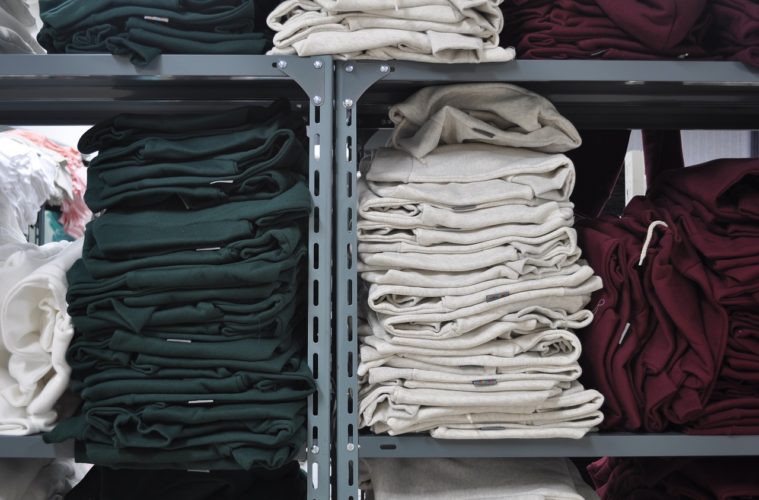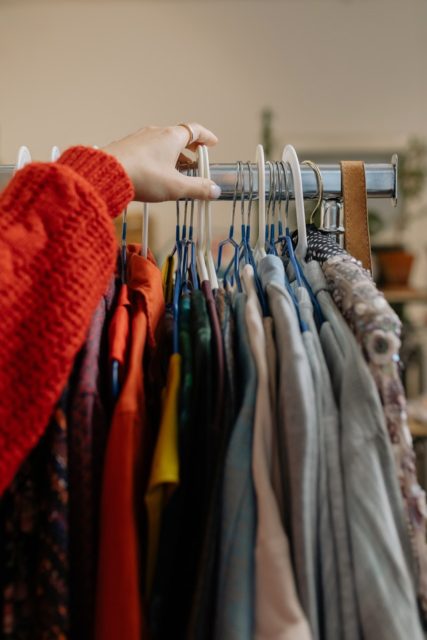If you are someone who is heavily into your outfits, there’s no doubt your Instagram feed is filled with influencers promoting the latest fashion trends. Now, there is nothing wrong with being a lover of the ‘garms’, it’s creative, experimental and exciting. However, fast fashion is real and it’s about time we try to reduce our contribution – because we DEFINITELY can.
NEGATIVE IMPACTS
You might be new to all of this. What is fast fashion? Fast fashion is essentially the process of mass-producing off the catwalk fashion pieces at a low cost. Ok, so what is the harm?…
Currently, there is an increasingly high volume of fast fashion clothing brands. This can result in someone having a large quantity of clothes in their wardrobe. Therefore, clothes end up not being worn, being thrown out and contributing to landfill. In fact, £140m of clothing goes to landfill each year. Our world is constantly being overwhelmed with waste materials as a result of consumers.
Moreover, the conditions and wages of workers who mass produce fast fashion clothes are undoubtedly poor. This means low-quality working environments, potential health risks and unjust working hours.
The ‘Rana Plaza Disaster’ in 2013 is a case which displays the tragic impacts of the fast fashion industry. Situated outside Bangladesh, the Rana Plaza was a building which contained multiple clothing factories. It supplied clothes for well-known retailers, such as Matalan, Mango and Primark. The building collapsed with more than 3000 people inside, killing 1134 and injuring over 2500.
It was later found out that the building’s upper floors were built without a permit and were structurally insecure. Mr Rana – the owner of the building – prioritised profits over the welfare of his workers and was charged for violating building codes, as well as 17 other people.
The environment suffers greatly from the negative impact of the fast fashion industry. Textile materials are continuously being thrown away due to over-consumption. Materials such as, polyester and nylon, are used in production and require fossil fuels to make them. Oil spills, methane emissions and wildlife disruption are some of the damaging consequences of using fossil fuels. These materials are also non-biodegradable, contributing to landfill and polluting our environments.
Furthermore, the textile industry is one of the greatest industries to impose child labour. With 170m children currently within child labour-based jobs, the cotton manufacturing sector is a large contributor. Children are responsible for pollinating and harvesting the crops, as well as spinning, weaving and dyeing mills. In Uzbekistan, the government enforces children to spend their summer months picking cotton. In southern India, girls are made to work under detrimental conditions, where hormones are put in their food to prevent menstruation – women are seen as less productive when on their period.
WHAT CAN YOU DO?
So, what can you do? There are many things which can be done to decrease our contribution towards fast fashion. By making slight changes to our shopping habits, we can become more mindful with our approaches to buying and getting rid of clothes.
SECOND-HAND CLOTHING
ONLINE:
There are many online second-hand clothing shops where you can purchase clothes and re-sell clothes of your own. Make a little dosh on the side? Sounds like a winner to me!
DEPOP
Depop is a well-known fashion marketplace app. On the app, you are able to purchase clothes from second-hand sellers all over the country and overseas. You are also able set up your own Depop shop where you can list items you want to re-sell by their category, colour and style – fun!
THRIFT+
Thrift+ is an online charity shop-based retail website. It aims to provide convenience and the same quality shopping experience as regular shops. The site also provides Thrift+ Boutique which sells second-hand designer clothing and accessories – get your Gucci for less!
Again, you are able to re-sell your own unwanted clothes. Each item you do sell, you receive 33% back as Thrift+ credits to spend on the site, or this can be exchanged as a John Lewis & Partners gift card.
BEYOND RETRO
Beyond Retro is a leading vintage fashion retailer. The shop can be found online, as well as a number of stores based in the south of the UK and in Dublin, Ireland. The brand prides itself on being a shop with a sustainable vision and always providing the best handpicked vintage and second-hand pieces for customers.
IN PERSON:
If you’re someone who prefers the active shopping experience rather than scanning the web in your pjs, there are many in person options too!
 CHARITY SHOPS
CHARITY SHOPS
I know what some of you are thinking – charity shops are ‘lame’. However, with a good eye, an open mind and some visualisation, charity shops have some of the most surprising finds. And best of all, they are super inexpensive and have pieces likely to not be worn by anyone else – individuality is key. Let’s change the stigma people!
As you know, you can hand in your unwanted clothes to charity shops. But do please be sensible with your decisions. Always ensure the clothes and items you decide to give in have some quality remaining in them.
CAR BOOT SALES
Similarly, it’s all about your perception with car boot sales. Just because that sweatshirt isn’t looking pristine and crease free on the hanger, doesn’t mean you are not going to rock it. Car boot sales can actually be fun. Wrestling your way in to claim that pair of converses, haggling with the owner and skipping away clutching onto your funky new ‘garms’ with a mid-morning kick of adrenaline. Ok – maybe it’s not always like that, but you get the point.
TAKE A LOOK AT YOUR WARDROBE
“I have nothing to wear.” – oh please, you know that’s not true. Don’t worry, we have all been guilty of saying it. Now is the time to take on the task of getting everything out of your wardrobe and having a good look! Maybe you’ll discover that top you are yet to have worn with the label still intact? Or come up with a whole set of new outfits you can wear after lockdown?
Doing this reminds you of the clothes you have. So, next time you go on a shopping spree, ask yourself, do I really need a 5th pair of black trousers? I don’t think you do.
BORROW BITS
When you have an event coming up, it is easy to assume there’s a must to buy a brand-new dress, shirt or pair of shoes. Realistically, how many times are you going to re-wear that? I’ve heard once it’s on the gram, it’s a crime to wear it again – right?
Borrowing garments from a friend or family member can be a great way to stop overconsuming and overspending – it’s a two in one!
QUALITY OVER VOLUME
Let’s be honest, most of us have been guilty of doing it. Thinking to ourselves we must buy some new basics. We go on to our favourite online shop and select the ‘Low to High’ option.
If you are wanting to purchase something brand new, that’s fine. However, it’s important to consider quality. It’s easy to get swamped into these “Fantastic Deals” and let them lead you on to believe you are getting something worth your money. When actually, how long is that graphic tee going to last? Is it really worth picking up 3 tops which come to £30, or is it better to spend £30 on something you really love and know isn’t going to stretch and fade in the washing machine?
FAST FASHION ROUND UP
So, let’s round up. Fast fashion is happening and it is NOT good. It’s impossible to be 100% green, but evidently there are things we can do to reduce our impact. Things which are really quite simple when you think about it. Let’s start thinking wisely and make the positive change – it can be done!




 CHARITY SHOPS
CHARITY SHOPS